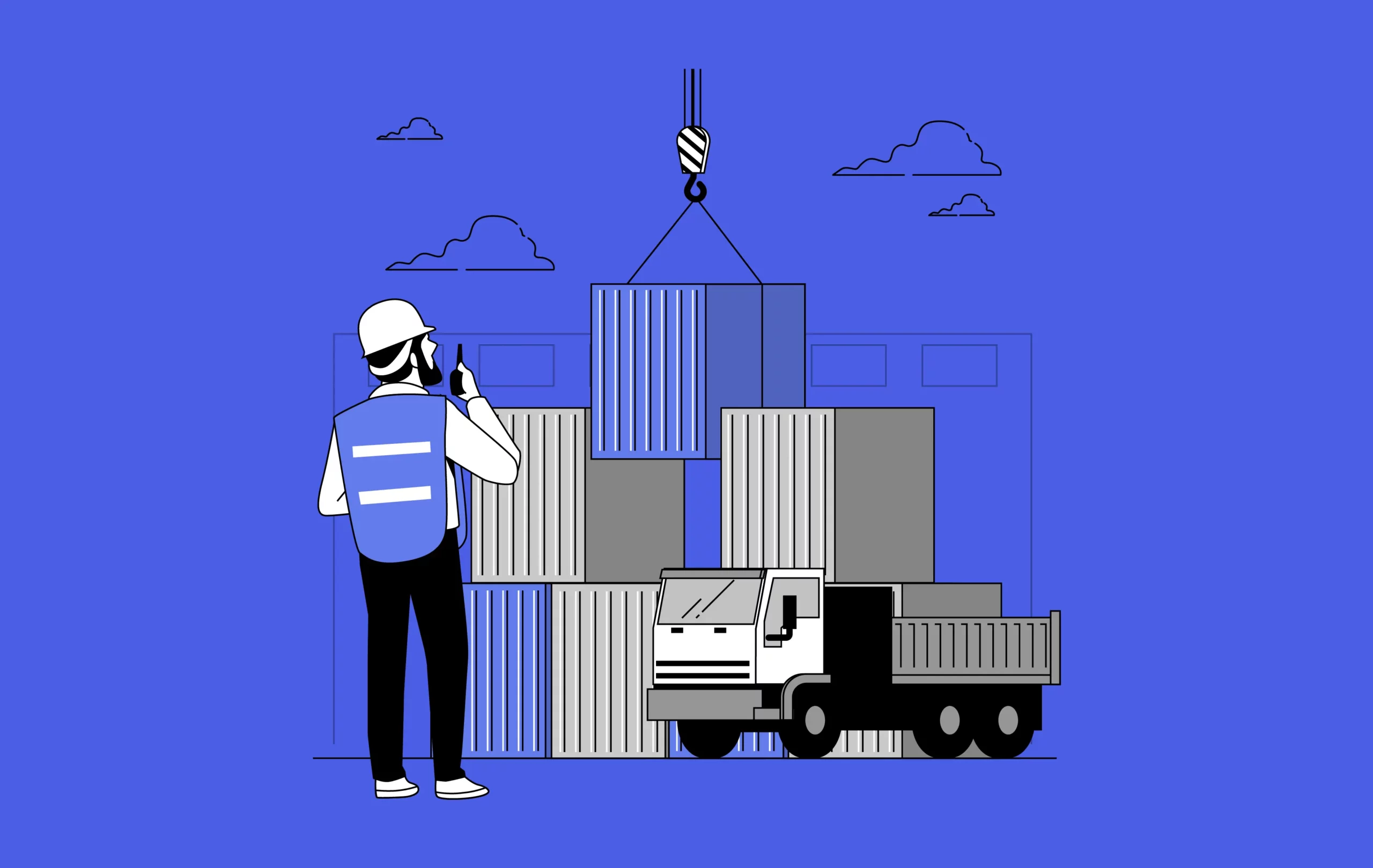- Benefits Of Digital Transformation for the Logistics Industry
- Increased Efficiency
- Facilitates Trust Among stakeholders
- Enhanced Routing
- Preventive Fleet Supervision
- Intelligence in Transportation
- The Impact of Digital Transformation in Logistics
- 360 Logistic Supply Visibility
- Actual Time Information/Data
- Integrated Internet of Things Supply Chains
- Automation Services
- What are the Digital Technologies used in Logistics?
- Blockchain
- Augmented Reality (AR) and Virtual Reality (VR)
- Big Data Analytics
- Artificial Intelligence and Machine Learning
- We have expertise in transforming logistics operations and supply chains
- We can help you transform your logistics operations
- FAQs
The logistics industry is undergoing a fundamental shift in how organizations use digital technologies to enhance their services, processes, and customer experiences. The global spending on digital transformation technologies and services are remarkably high—Statista reported it to reach $1.6 trillion USD by 2023—with Adroit Market Research noting that the market size for digital transformation in logistics and transportation grew from $54.92 Bn to $145.28 Bn between 2018-2025, with a CAGR of 13%. As a matter of fact, 25% of overall spending is dedicated to digital transformation initiatives in leading organizations,
This article seeks to offer insight into the substantial benefits achieved through investing in a comprehensive logistics digital transformation strategy as part of a wider plan for businesses in the transportation and logistics sector. We will also outline how this technology for logistics can help them gain a distinct advantage over competitors operating within dynamic markets alongside rapidly shifting customer expectations across multiple industries.
Benefits Of Digital Transformation for the Logistics Industry
Logistic companies adopting DX initiatives can expect several advantageous outcomes, including:

Increased Efficiency
As logistics and supply chain technology advances, the need of the hour is digital transformation in logistics. This includes cloud-based software from providers, allowing for centralized tracking and recording of transactions. With the help of this tech, logistic companies can provide customers with detailed information about progress to guarantee consistent and quality performance. As time progresses, the importance of this unified technology platform will only grow further.
Facilitates Trust Among stakeholders
The logistics industry is taking a big step forward by integrating blockchain-enabled digital shipping solutions within companies. This move builds trust between partners and helps the industry realize its ambitions of greater technological advancement.
Digital transformation in logistics has made it possible for customers to track their orders from beginning to end, offering both time and money-saving benefits. When people want to know when they can expect their shipment or if any changes have occurred, they no longer need to ask; they can head online or receive an automated message with all the relevant information included. Plus, when all parts of the process are kept informed, everyone benefits: trust increases, and bottlenecks decrease.
Enhanced Routing
Investment into state-of-the-art software has resulted in a major shift in the logistics industry – improved routing. Thanks to digital transformation in logistics and supply chains, drivers can easily identify the most efficient routes with minimal navigation and delay risks. If there are congestion issues such as road works or traffic accidents, alternative paths will be suggested to reach the destination without delays. Financially, this technology helps logistic companies save money by allowing vehicles to use shorter routes, drive fewer miles and consume less gas.
Preventive Fleet Supervision
AI-enabled predictive maintenance in supply chains and logistics is a boon for companies. It allows them to identify vehicle problems and take preventive measures remotely. With the early identification of vehicles needing repairs, teams can quickly respond to minimize downtime, reducing costs significantly. It provides a cost-benefit, and customers know the logistics firm provides reliable services for their peace of mind.
Intelligence in Transportation
Logistics processes have seen an increase in data since the digitalization of operations. As a result, businesses should consider investing in advanced analytical techniques for better decision-making in the logistics industry. Cognitive Computing and AI software development services are needed for making informed decisions regarding marketing strategies. Still, they can also provide supply chain management, process optimization, cost-efficiency, improved customer experience, and increased communication from start to finish.

The Impact of Digital Transformation in Logistics
The e-commerce industry has had a major impact of digital technologies on logistics efficiency; companies are rapidly turning to digital solutions such as improved communication systems and tracking software, which increases efficiency and easily facilitates collaboration between carriers, shippers, and cargo forwarders. Logistical projects focus on maintaining maximum efficiency at minimal costs while providing quick and hassle-free delivery to customers. Technologies such as blockchain, IoT, and AI are revolutionizing how business is conducted in logistics to accomplish this goal.
360 Logistic Supply Visibility
Companies must find efficient methods for gathering supply transport data from various sources like ERPs, spreadsheets, custom methods, and payables for maximum visibility. This is where the 360 approach proves useful. It integrates all the disparate data into a single system, giving ongoing understanding.
It lets organizations track and manage goods throughout the logistics network, giving them a timeline view of information submitted by each company involved. Utilizing the 360 approach keeps everyone using the same information which provides clear visibility to all activities and outcomes within the logistics chain.
Actual Time Information/Data
Synchronized data are a crucial component of supply network visibility, enabling organizations to observe the state as it stands in real-time. In transportation, where changes can happen unpredictably, the ability to process and source the exact data (especially regarding routes, locations, carriers, and stops) helps businesses adjust immediately.
Furthermore, this data lets Freighters generate the most efficient routes based on the current situations, reducing the possibility of being held up in major transit hubs and ports. Investing in exact insights provides an extra layer of efficiency for better service and customer experience.
Integrated Internet of Things Supply Chains
Today, IoT technologies revolutionize supply chain operations. IoT devices capture product identification and sorting data, shipment routes, location tracking, and inventory management. Combining IoT and computer vision to capture and process data instantly reduces the risk of human error associated with manual document filling.
Due to that automation, stores can track issues, wears and tear, or lost shipments in real-time without additional effort. Additionally, through AI-powered IoT vehicles, freight transport is becoming more efficient by offering optimized loading/unloading solutions and route optimization between ports.
Automation Services
In the current business landscape, automated logistics processes are imperative in streamlining the activities of couriers and shipment forwarders. With automation, an array of time taking and also error-free tasks can be facilitated—from freight identification to tracking, path planning, timeline administration, quoting, bidding, and storehouse operations. All players involved in the logistic chain stand to gain from optimized data processing and software for automation purposes.
What are the Digital Technologies used in Logistics?
The logistics and transportation sector can benefit from many technologies. These technology used in logistics:
Blockchain
Blockchain technology in logistics and supply chains can be immensely beneficial for international cargo shipments. Smart contracts and dApps are providing a much-needed increase in trust and visibility within supply chains, offering secure data distribution, decentralization, and validation. In particular, blockchain has proven incredibly useful for improving shipment visibility.
Augmented Reality (AR) and Virtual Reality (VR)
Augmented Reality has the potential to fundamentally transform the use of warehouses and cross-docking areas by revolutionizing their picking, packing, and commissioning operations – and providing a major competitive edge for logistics companies. Additionally, Virtual Reality can offer significant advantages regarding package delivery. Critical shipping info such as weight, content, and handling directions can be shown on windshields or VR glasses – meaning drivers no longer need to access handheld devices to check alternate routes, traffic jams, or blocked roads.
Big Data Analytics
Logistics companies have access to immense datasets, and sophisticated algorithms are necessary to comprehend the entirety of those data points. Deep learning is a beneficial tool, enabling them to convert large amounts of often unstructured data into actionable insights. By analyzing big data, they will be able to determine what adjustments should be made to stay ahead in the competitive market. Moreover, as deep learning can discover correlations from high-dimensional datasets, it may be instrumental in helping logistics companies spot potential problems that could result in costly delays or a negative CX.
Artificial Intelligence and Machine Learning
AI and ML can address supply chain issues of governance and long-standing data silos, allowing for improved visibility and integration throughout the remote network of stakeholders. Digital logistics platforms can provide interconnected systems that enable logistic service providers to optimize operations, creating a better experience for customers.
We have expertise in transforming logistics operations and supply chains
Client Issues and Needs: The large-scale manufacturing enterprise requires complex supply chain and logistics solutions to stay competitive in an ever-changing landscape. Key issues included decentralized operations needing more visibility across the supply chain, data errors related to goods receipts and sales orders, and inefficient processes caused by disparate manual tasks. As a result, the company’s operational efficiency suffered.
Our client sought a comprehensive supply chain logistics software development solution to address these challenges, automating their processes, optimizing productivity and cost-effectiveness, streamlining the data flow between different systems, and scaling accordingly.
Our solution: Our team dived deep into this project by taking the time to understand the client’s needs comprehensively. We worked rigorously – with developers, designers, and project managers – to ideate and enact a supply chain logistics software solution that best suits their business. With multiple factors at play during this selection process (such as supply chain visibility, product deployment speed, and technological support), we eventually decided on Robotic Process Automation (RPA) coupled with data analytics.
Using AI-powered RPA paired with analytics provided insight into their supply chain. Through complete visibility into process execution and root cause analysis, our system improved the company’s operational efficiency tremendously. The bots automated manual processes, so multiple error types are now searched for records, resolved when found, and workflow completion is done automatically through an email sent to stakeholders.
We can help you transform your logistics operations
Digitization is a game changer in logistics services, as modern technologies allow for increased efficiency and cost savings, and at Appinventiv, we have mastered digital transformation. With years of experience building cutting-edge digital products, we do the same for the supply chain and logistic industry being the top-rated logistics software development company.
By automating tedious tasks associated with warehousing and manufacturing and offering top-class digital transformation services, we make supply chains smoother, more profitable, and more agile. Ultimately, digitization plays a huge role of technology in logistics in improving the flexibility of supply chains while at the same time granting easier access to data and information. Contact a IT consulting firm like ours, to transform your supply chain and skyrocket your logistics operations.
FAQs
Q: What is digitalization in logistics?
A: Digital change is an essential element of efficient logistics. Technologies such as automation, data analytics, and cloud computing can all be combined to streamline operations and improve customer satisfaction. Utilizing these digital solutions can lead to cost savings for businesses while providing a better customer experience.
Q: How are digital technologies impacting the logistics industry?
A: The logistics industry is currently undergoing large-scale transformation, supported by digital technologies. Automation, real-time data analytics, and improved visibility are core elements of this shift, leading to increased operational efficiency, cost savings, and enhanced customer satisfaction.
Q: What are some examples of digital technologies in logistics?
A: Digital technologies, such as the Internet of Things (IoT), robotics, artificial intelligence (AI), cloud computing, blockchain, and big data analytics, are transforming logistics operations. These tools enable businesses to optimize supply chain operations and automate mundane tasks. Integrating digital technologies into logistics processes is improving the efficiency of these operations and allowing businesses to achieve new heights in performance.



Route Planner App Development - Costs, Benefits, Features
In the complex world of logistics, where cost-effectiveness and on-time delivery are crucial, route planning is a prominent challenge that can significantly impact the business's bottom line. For fleet managers and drivers alike, navigating the intricate web of roads, traffic, and constantly shifting variables can be an enormous undertaking. This is where route planner apps…

Transportation Management System Development: A Detailed Analysis
In a period of five years, the focus of the supply chain has gradually shifted to making transportation - both inbound and outbound - a streamlined, efficient process. As a response, several transportation management software development solutions have entered the market with the intent of smoothening transport operations and offering network optimizations. Every logistics company…












